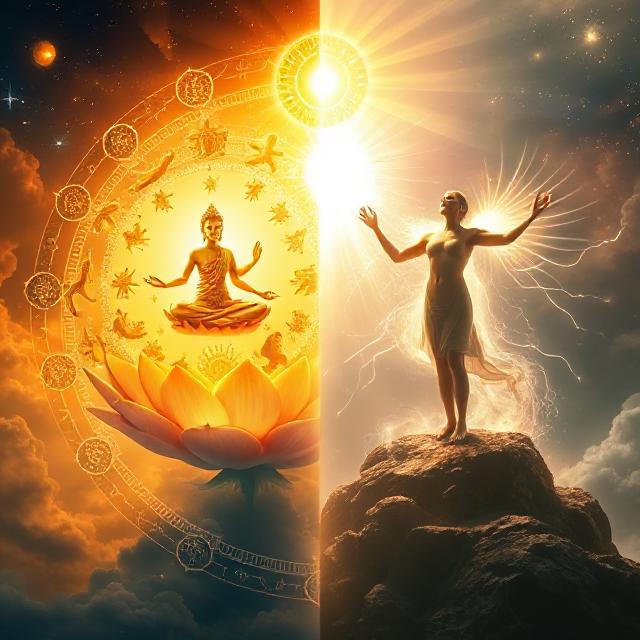
Table of Contents
Rebirth vs Resurrection: Metaphysical Implications Explained
What happens after we die? Two major answers dominate the religious and philosophical imagination: rebirth and resurrection. Though often used interchangeably in casual conversation, these concepts point to profoundly different metaphysical systems. Comparing rebirth vs resurrection is not just a matter of theology, but a window into how cultures understand the soul, time, justice, and the meaning of existence.
This article unpacks the core distinctions between rebirth and resurrection, exploring their implications across Hinduism, Buddhism, Christianity, and Islam—and what they reveal about the human desire for continuity beyond death.
I. Defining Rebirth and Resurrection
A. What Is Rebirth?
Rebirth refers to the cyclical return of the self (or consciousness) into a new body after death. Common in Hinduism, Buddhism, Jainism, and some forms of Taoism, it implies a continuity of karmic energy, not a fixed soul. In these traditions:
- Death is not an end, but a transition.
- The new form is shaped by past karma (actions and intentions).
- The process is ongoing until one achieves liberation (moksha or nirvana).
“Just as a man casts off worn-out clothes and puts on new ones, so the embodied soul casts off worn-out bodies and enters into others.” — Bhagavad Gita 2:22
B. What Is Resurrection?
Resurrection, by contrast, involves the reanimation of the same individual body and soul, typically at the end of time. Found in Christianity, Islam, and Judaism, it entails:
- A singular afterlife event, often tied to judgment.
- The same person returning in a glorified or restored form.
- An emphasis on historical and bodily identity.
“I am the resurrection and the life. He who believes in me will live, even though he dies.” — John 11:25
II. Metaphysical Frameworks
| Concept | Rebirth | Resurrection |
|---|---|---|
| View of Time | Cyclical, infinite | Linear, historical |
| Soul Identity | Mutable, dependent on karma | Fixed, eternal soul |
| Purpose | Liberation from cycles | Eternal life with God |
| Judgment | Ongoing through karma | Final, eschatological judgment |
| Body-Soul Link | Loosely associated | Tightly integrated |
Rebirth presents the self as part of a vast web of becoming. Resurrection affirms a once-for-all restoration.
III. Rebirth in Eastern Traditions
A. Hinduism
In Hindu metaphysics, the atman (self) undergoes countless births. These are not always human:
- Karma determines rebirth as animal, deity, or even plant.
- Moksha, or liberation, ends the cycle by realizing the self as one with Brahman.
This implies a non-linear journey of spiritual maturation rather than a single test.
B. Buddhism
Buddhism denies a permanent soul (anatta). Yet it upholds rebirth through dependent origination:
- Craving and ignorance cause rebirth.
- Liberation (nirvana) is freedom from this cycle.
Here, rebirth is not personal continuity, but a stream of causation. What continues is karma, not a fixed entity.
IV. Resurrection in Abrahamic Traditions
A. Christianity
Christian theology views resurrection as a bodily restoration:
- Jesus’ resurrection is both model and promise.
- At the end of time, all will rise for judgment.
- Salvation is union with God in a glorified body.
This reflects a strong identity continuity, where the same person endures death.
B. Islam
In Islam, resurrection (Qiyamah) follows death and a waiting period (Barzakh):
- All humans are raised bodily for divine judgment.
- Paradise or hell follows based on faith and deeds.
The emphasis is on moral accountability, resurrection being the moment of reckoning.
V. Philosophical Implications
A. The Nature of the Self
- Rebirth suggests a self shaped by impermanence and influence.
- Resurrection emphasizes a stable core identity.
Is the self a stream or a stone? This is a key divide.
B. Justice and Continuity
- Rebirth allows for gradual moral evolution, across lives.
- Resurrection presumes a final resolution and judgment.
This raises questions about fairness: is one life enough to determine eternal fate?
C. Time and Meaning
- Rebirth sees time as a cycle: no absolute beginning or end.
- Resurrection imposes a cosmic narrative arc.
Each shapes existential meaning: endless return vs divine conclusion.
VI. Can the Concepts Be Reconciled?
Some modern thinkers suggest that rebirth and resurrection may be metaphors for transformation:
- Psychological death and renewal
- Ego dissolution followed by spiritual rebirth
- Archetypal journeys of descent and ascent
In this view, both rebirth and resurrection point beyond death, toward inner evolution.
Conclusion: Two Visions of Life Beyond
Rebirth vs resurrection embodies two grand visions of what it means to die—and to live. Rebirth offers a poetic dance of karmic cycles, inviting detachment and gradual liberation. Resurrection offers moral finality, dignity of the body, and reunion with the divine.
Whether one sees time as circular or linear, the self as fluid or fixed, these doctrines offer more than answers. They challenge us to consider what truly endures: the soul, the story, or the mystery of being itself.
